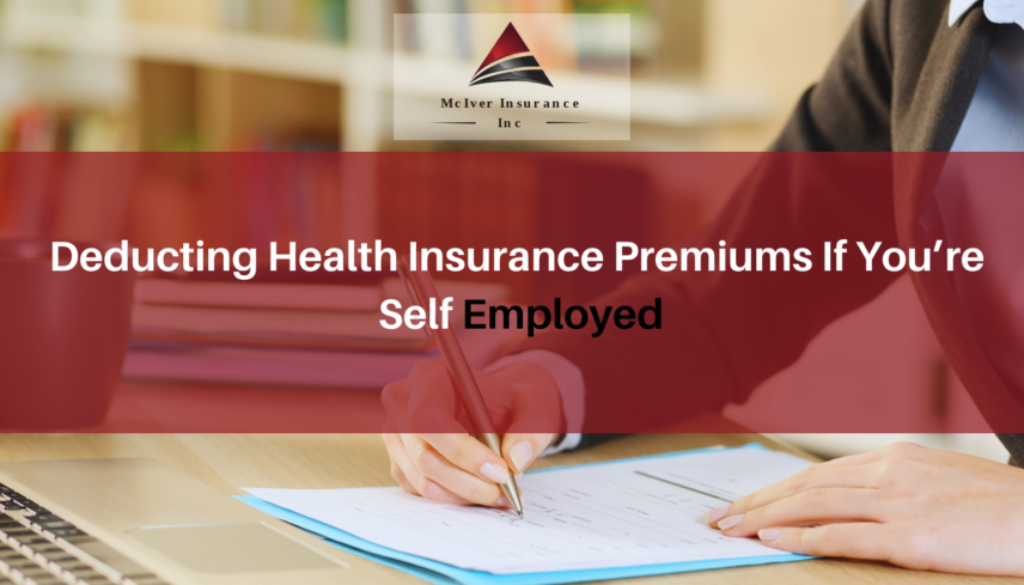Deducting Health Insurance Premiums If You’re Self Employed
Being self-employed means you need to get your own personal health insurance. You can no longer take advantage of your employer’s plan. You could potentially make use of your spouse’s plan if they have a good one. But the chances of that are often slim.
Being self-employed means that you are now on your own and it is not easy. It is a challenge! With so much to handle, those of us who are self-employed often forget about things like health insurance until there is a medical emergency.
If you are not insured and there is a medical emergency you can easily be charged thousands of dollars that would otherwise be taken care of by health insurance. With premiums increasing day by day along with deductibles there may not seem any viable and affordable options in the market.
So, how then can those of us who are self-employed afford and find quality health insurance? Well, we are here to help!
Table of Contents
Managing Health Care Expenses
Does your monthly budget take a hit after you have just made an unexpected visit to the dentist? Is it a contingency that your doctor would prescribe you medication that will last for the rest of your life?
With the help of a personal insurance plan, you can relax knowing you have the budget to cover unexpected medical expenses. Ideally, you should be looking for an affordable monthly premium health insurance plan instead of trying to speculate how much your next unexpected medical visit is going to cost.
Planning ahead is going to be especially crucial for you to remain financially successful in life. Self-employed people must understand that they need to make a healthy lifestyle a constant priority in their life. You do not have the luxury of relying on a corporate health insurance plan if you fall seriously ill.
Self-employed individuals must make the stand and must have a financial solution for the unexpected costs of medicine, dental consultations, and possible disability coverage.
Assessing The Cost Of Health Care In Canada
The average Canadian household spends more than $2,300 annually on dental and medical expenses. These expenses include visits to the ophthalmologist, dentist, hospital visits, medication, and other medical expenses not included in public or private medical insurance plans.
Based on statistics, annually roughly six million Canadians are apprehensive to visit their dentist just because of the high prices. These statistics also mention that self-employed individuals are particularly reluctant to take on extra medical expenses because they have a lower income in comparison to the salaries and benefits of permanent employees of large organizations.
Practically speaking, it is difficult to suddenly come up with funds if you are confronted with unanticipated medical expenses costing hundreds of dollars. This is all the more the reason that self-employed individuals should have some sort of safety net for extraordinary circumstances and unanticipated medical expenses.
Can The Self-Employed Claim Health Insurance?
Self-employed tax-paying citizens can deduct premiums against medical payments. These medical payments can qualify as dental, medical, or protensive insurance care coverage for you, your spouse, and eligible dependents.
This means that the health insurance write-off for the self-employed will benefit them regardless of whether or not they itemize their deductions. The write-off will benefit self-employed individuals because it will lower their adjusted gross income (AGI) and in turn lower their tax.
It is preferred to have a lower adjusted gross income so that you are not unfavorably affected by phase-out rules that can reduce the number of tax breaks you get. Remember that if you are getting tax breaks you cannot deduct the premiums at the time of calculating your self-employment tax liability.
All of these tax breaks are only applicable if you or your spouse are not participating in any kind of employer-subsidized medical insurance plan. To clarify this with an example, you will be eligible for a deduction of premiums of four months if you were unemployed for the last four months and working on your business.
Are Insurance Premiums Tax Deductible?
The specific tax situation of your business or organization can determine whether the insurance premiums are tax-deductible or not. Canada’s Income Tax Act contains a wealth of information about the deductibility of insurance premiums and specific rules that apply in certain scenarios. The only problem is that it will take a very long time to read the entire ITA so we will try to give you a general idea. In most cases, disability, health, and life insurance premiums are not tax-deductible for businesses or individuals.
How Do I Pay For Medical Expenses?
There are three basic ways self-employed individuals can pay for medical expenses
- Conventional Medical and Dental Insurance: This is the option that most self-employed individuals should try to opt for if they are financially stable. The self-employed individual pays a regular premium and gets medical coverage. This is a viable option for financially stable individuals because there might be some situations where you might need to purchase “extra coverage” for certain items or pay out-of-pocket for medical expenses that are excluded in the policy.
- No Insurance: Carrying comprehensive medical insurance is not cheap in this day and age. It is difficult to find an insurance provider that will provide the right kind of coverage at the right cost. This leaves financially volatile self-employed business owners with no other option but to not have any medical insurance at all. What you can do is regularly deposit money in a savings account and only use those funds when you fall into a medical emergency.
- Health Spending Account: This is one of the best options for self-employed individuals that have just started a business and plan to continue it for a long time to come. With the Health Spending Account (HSA) your business can pay 100% of your medical expenses. This is a win-win situation for the business and self-employed individual because you save a lot of money and the business gets 100% tax-free refunds.
What Is The Qualification Criteria For The Health Spending Account?
Any self-employed individual that owns a corporation pays income taxes and has to bear medical expenses that qualify for the health spending account. Almost all kinds of medical expenses are covered through the HSA. The cost of the HSA will vary based on the corporate structure of the organization. This method makes sense especially when you look at it from the perspective of the owner and employee.
The employer can decide exactly how much medical benefits will be available for certain employees based on the organization’s budget. For example, the employer prescribes a certain fiscal amount of medical coverage for a certain employee. The employee can claim medical expenses up to the predetermined amount for a certain month.
Getting Professional Advice
Remember that this is just a basic explanation of how self-employed health insurance deduction works. It is recommended to seek professional consultation from a local Health insurance firm in Halifax that understands your company’s specific insurance needs like McIver Insurance. With their help, your start-up organization can get personalized insurance advice whether you have a few employees or various departments with several employees in each division. One of the biggest advantages of consulting a professional insurance firm is that with their experience, they can help you get the best rates and meet your insurance demands.



